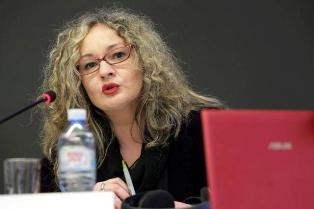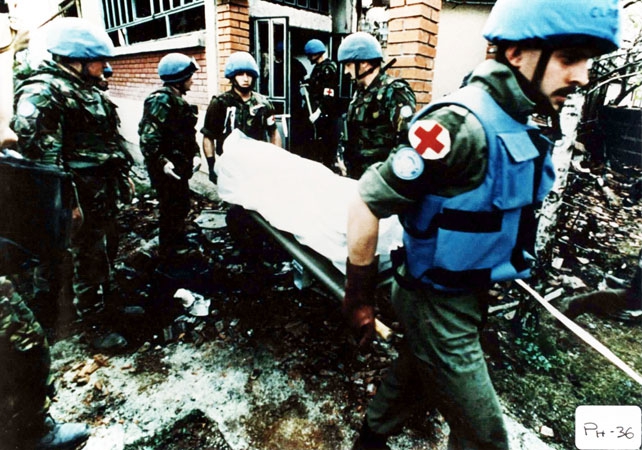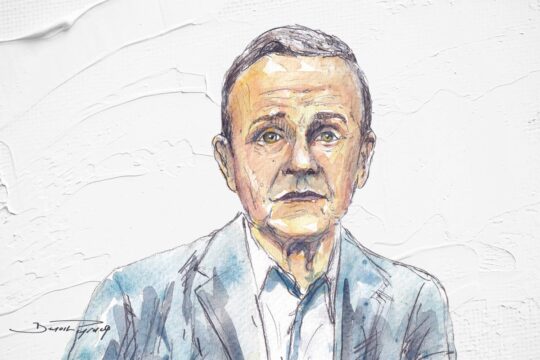Here we publish a dialogue between Serbian historian Marijana Toma and Tomasz Lachowski, journalist and legal researcher at the University of Lodz in Poland. Toma is a former Deputy Executive Director at Humanitarian Law Center (Fond za humanitarno pravo) in Belgrade and coordinator of the Working Group for drafting the Statute of RECOM, the proposed regional truth commission for the whole former Yugoslavia.
Tomasz Lachowski: Twenty-one years have passed since one of the greatest atrocities in the modern world occurred – Srebrenica massacre. It is hard to believe, but even today, more than 20 years after the genocide, bodies of victims are still being identified. Relatives of those annihilated by Ratko Mladic troops in July 1995 are still searching for ‘missing people’, trying to realize their right to know the truth about what happened. It seems the transitional justice process is a never ending story in Bosnia and Herzegovina. Is reconciliation, in such reality, possible?
Marijana Toma: In the last few years, we can observe a tendency among political elites in post-Yugoslav societies that reconciliation should be based on forgetting of the past, especially of atrocities committed during conflicts in 1990s and focusing on common future within the EU. While this approach was successful in certain cases, it is not, and cannot be a recipe for reconciliation and sustainable peace in the Balkans. Even today, 21 years after ending of wars in Croatia and Bosnia and Herzegovina and 17 years after the war in Kosovo, we still face families in desperate search for their loved ones, who are still missing, not only in Srebrenica, but across countries established on the territory of former Yugoslavia. Reconciliation among communities and post-Yugoslav countries needs to be based on fulfillment of right to truth, not only for survivors, victims and their families, but for societies as a whole, and more importantly on acknowledgment of truth about crimes committed against their loved ones. Secondly, reconciliation needs to be based on prosecuting those responsible, especially those who obtained high- or mid-level positions within army and police forces during conflicts, in order to open the question of accountability of states policies of war crimes. This needs to be followed with extensive vetting initiatives and removal of persons who were involved in committing crimes, or allowed them to be committed without prosecuting or punishing them during conflicts from relevant institutions. Finally and most importantly, reconciliation in post-Yugoslav states needs to be based on complete fulfillment of victims’ rights to reparations, both material and symbolic. If we take an honest look at the current results of the transitional justice processes in post-Yugoslav countries, we can surely claim that the process is only at the end of beginning for majority of countries and we are very far from the reconciliation as the final goal.
Tomasz Lachowski: Don’t you have an impression that, especially in Western societies, ‘Srebrenica massacre’ dominated the narrative over the Balkan conflicts? Probably, some more people recognize the tragedy of the besieged Sarajevo, but, for instance, awareness on concentration camps in Prijedor and surroundings like Omarska, Trnopolje and other similar places is rather limited. Is the Western world already bored with Balkan war and post-war problems?
Marijana Toma: Srebrenica genocide is surely the most recognized among many atrocities committed in the former Yugoslavia, primarily because this was the only crime judicially qualified as genocide by the International Criminal Tribunal for the former Yugoslavia (ICTY), but also because of its intensity and number of victims in such a short amount of time. However, it seems that many crimes committed in wars in Bosnia and Herzegovina, Croatia and Kosovo are remembered and acknowledged only within their own communities and those who suffered – that is the case of concentration camps in Prijedor municipality, rape camps in Foca and massacres in Visegrad, Ahmici, Vukovar, Dubrovnik, crimes committed during the Croatian army Operation Storm in August 1995, Suha Reke, Prizren, Decani, Podujevo, etc. At the same time, majority of these crimes are not recognized, actively denied or even justified from the side whose forces were responsible for these massacres. It is no wonder that international community, facing different challenges in the last decade and more, quite similar to what happened in Balkans in 1990s, feels a fatigue with societies so reluctant to honestly open the process of dealing with the past. Right now, my impression is that only a lack of open conflict among post-Yugoslav countries is what makes international community satisfied with developments in this area.
Tomasz Lachowski: More than two decades have elapsed since the Dayton Agreement was signed (in 1995) and the International Criminal Tribunal for the former Yugoslavia (ICTY) was established (in 1993). What are the main achievements and biggest failures in your eyes?
Marijana Toma: The main achievements were made primarily by the ICTY – prosecutions of those most responsible for the war crimes, among them former heads of states, politicians, main Army and Police officials, etc; and establishing facts about atrocities that were committed, compiling and creating vast documentation, thus making the wars in the former Yugoslavia probably the best documented conflict in the recent world history. Some positive developments were marked in prosecutions on national level, primarily in Bosnia and Herzegovina, however, prosecution efforts in Croatia, Serbia and Kosovo and especially Montenegro have faced serious problems and I cannot evaluate these as satisfactory. When it comes to developments in the area of right to truth, achievements were made only by the civil society organizations, which have developed and have been actively promoting the idea of a regional truth commission since 2006. The main failure is surely in the area of reparations – only symbolic steps were made, such as apologies, and majority of these were taken for political gains within international community. Victims are still treated through the lenses of ethnicity - their rights are respected only if they belong to dominant ethnic group, civilian victims are not treated equally as ex-combatants, and women victims of sexual violence are still struggling for recognition in their societies.
Tomasz Lachowski: How would you assess the functioning of the ICTY, not only as a criminal judicial body, but also a significant element of a post-conflict environment?
Marijana Toma: As previously said, ICTY has contributed the most to the process of transitional justice in the former Yugoslavia, not only through prosecuting those most responsible but also through obtaining, collecting and creating valuable documentation for establishment of facts about crimes. A large amount of this documentation has already been made public through ICTY public database and serves as the most important source for research about Yugoslav wars. The documentation, especially Army and Police documentation obtained by the ICTY from the states established in the former Yugoslavia most certainly would not be available to researchers if it was not for the ICTY. Therefore, we can certainly claim that the contribution to the process of accountability and process of truth-seeking by the ICTY has been the most significant contribution of all institutions established with a purpose to deal with the legacy of crimes in the former Yugoslavia.
Tomasz Lachowski: For a long time the ICTY was labeled as an ‘anti-Serbian’ court, another instrument of the USA or the EU to stigmatize Serbs for the war atrocities. Do you see any change in the perception of the Hague Tribunal by your compatriots?
Marijana Toma: The perception of the ICTY in Serbia has not changed. From the first post-transition government until the current one, ICTY was either perceived as a court designed to prosecute only Serbs/members of Serbian forces, or as a tool to receive financial or political support in the EU integration. The cooperation with this court was never presented by political leaders of Serbia as a moral obligation of the state, whose forces and forces under its strong control (Croatian and Bosnian Serbs) committed majority of crimes in three conflicts in the 1990s. The honest questioning of responsibility of Serbs or Serbia was never the most important issue to be discussed when cooperation and work of the ICTY were discussed by political leaders. Several judgments, such as acquittals in Ante Gotovina (a Croatian general) and Ramush Haradinaj (a former officer and leader of the Kosovo Liberation Army and subsequently prime minister of Republic of Kosovo) cases served primarily to nurture the perception of the Hague tribunal as the ‘anti-Serb’ tribunal, without seriously analyzing the facts established and what led to these judgments. On the other hand, judgments where the responsibility of members of Serbian forces was established were and are denied, taken out of context in order to continue nurturing nationalistic policy that stood behind the atrocities that were committed.

Marijana Toma
Tomasz Lachowski: Most often we associate the transitional justice efforts in Balkans only with the pure retributive, criminal response, streaming either from the Hague, or the local war chambers in Sarajevo or Belgrade. A question arises – what with the non-criminal endeavors, namely truth-telling and truth-seeking processes? Why such initiatives as Truth and Reconciliation Commission in the Federal Republic of Yugoslavia in 2001, known as ‘Vojislav Koštunica’ commission, or an idea to create a truth commission for the city of Bijeljina in northeastern Bosnia and Herzegovina, which was the site of the Serb concentration camp, in 2007, simply failed?
Marijana Toma: The experiments, such as the Truth and Reconciliation Commission in the Federal Republic of Yugoslavia in 2001, and Bijeljina Commission, show how irresponsibly political elites treated the issue of the right to truth. The model of establishment, composition of the commissions and its members who were close to those who committed crimes, lack of clear mandate in both cases actually prove that both commissions were set to fail from the very beginning. The motives for the establishment of these commissions certainly were not the establishment of facts about atrocities, or clear break from the past violence. Now, we can claim that their purpose was in fact to try to close the process of truth-telling and prevent meaningful truth-seeking process.
Tomasz Lachowski: You worked in 2010 and 2011 as a coordinator for drafting the statute of the regional truth commission (RECOM), covering all countries of the former Yugoslavia. On a paper, having in mind its strong mandate, commission seems to have potential to become quite powerful institution in the post-conflict landscape of Balkans. What are the real chances to establish RECOM at present?
Marijana Toma: With the current political situation in the countries established on the territory of the former Yugoslavia, and the current crisis of the EU, which has supported the establishment of RECOM, unfortunately, very small. On the other hand, RECOM is still, in my opinion, the best chance of the region to honestly deal with the legacy of atrocities committed during the 1990s wars.
Tomasz Lachowski: Ed Vulliamy, a British journalist, author of the book The War is Dead, Long Live the War: Bosnia, the Reckoning, clearly underlines the necessity of a full disclosure of facts regarding the war crimes and official acknowledgment of suffering not only by the authorities, but especially by the common people. As we all know, such crimes committed in Balkan conflicts cannot be simply forgotten. How do you see an issue of education of young generations on the ‘never again’ principle, if ethnic divisions are so deeply rooted in peoples’ minds?
Marijana Toma: With the current development of transitional justice process, I would argue that education of young generations is the most crucial precondition of reconciliation in the Balkans. The new generation is obviously going to be the main carrier of the process of reconciliation, since the older generations obviously failed in it. Currently, what we are experiencing can be defined as ‘wars of memory’ and ‘wars for memory’, with each ethnic group nurturing the self-victimizing version of the past, thus actively preventing the dealing with the past process. This situation turns new generations into hostile enemies of the process of reconciliation and the only strategy that needs to be implemented in order to prevent this is education based on established facts about crimes. Region of the former Yugoslavia, unlike some other contexts has that advantage of many facts already being established, collected and preserved by the ICTY, ready to be incorporated in the educational systems of the countries. However, I am afraid that we will wait for a long time to see this process happening, since formal educational systems are still perceived by nationalistic elites as the last defense of their ideology.
Tomasz Lachowski : After the 21 years of post-conflict mechanisms being implemented in many post-Yugoslav countries, have you become more optimistic or pessimistic, regarding the final success of transitional justice strategies in Western Balkans?
Marijana Toma: Following the process of transitional justice in countries established on the territory of the former Yugoslavia and seeing its results, I am far more pessimistic and honestly worried for the future of the region, if we continue to equate reconciliation with forgetting and hiding the narrative about conflicts and atrocities under the carpet.





